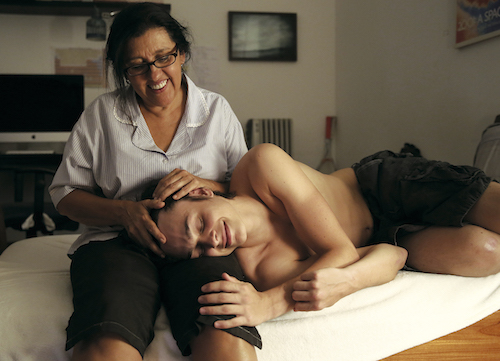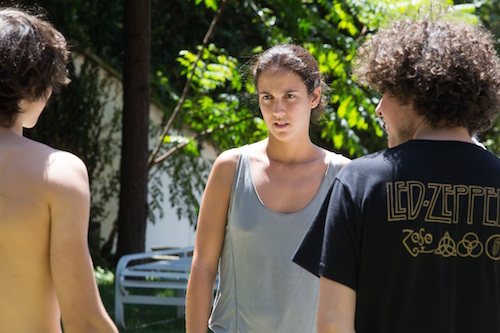Mothers and Other Strangers
The latest feature from Brazilian filmmaker Anna Muylaert may take place in São Paulo, but its story could be transplanted to any country with a functioning class system. While class differences and tensions are at the heart of The Second Mother (Que Horas Ela Volta?), the film also tackles complicated family dynamics; the result is a multi-layered drama that is as entertaining as it is perceptive.
Val (Regina Casé) is the longtime housekeeper for an upper-class family consisting of laid-back Dr. Carlos (Lourenço Mutarelli), his driven, successful wife Bárbara (Karine Teles) and their teenage son Fabhino (Michel Joelsas), who Val has virtually raised from childhood. Casé is a physically and emotionally expressive actor and her character is a warm, forceful presence, whether interacting with the family or with other workers in the home, especially younger housemaid Edna. Val’s constantly in motion, serving or cleaning up after the family, comically miming her feelings to Edna or muttering to herself as she goes about her duties. She has an intensely affectionate relationship with Fabhino, a coddled kid she caresses and croons to like a baby; he clearly enjoys the attention. In one scene, Val eavesdrops as his parents question him about marijuana they found, then she helps him hide it; the two are totally in cahoots.
Val hasn’t seen her own daughter Jéssica (Camila Márdila) in 10 years, as the girl has been living up north with relatives while her mother works in São Paulo. One day, Jéssica calls and announces that she is coming down to the city to apply to the university.
“Of course she can stay here; you’re almost family,” says Bárbara upon hearing the news, no doubt imagining some mini version of the simple, servile Val. Jéssica, however, is very much her own person; intelligent and self-confident, she views her chosen field of study, architecture, as a means for social change. She intuits that staying at the house of her mother’s employers is not a good idea, but she has no choice: that’s where Val lives. The family – especially Carlos – is impressed by Jéssica’s intellect and drive, and initially treat her like a guest, in stark contrast to their behavior toward good old Val. When Jéssica refuses to be deferential and asks if she can stay in the guest room rather than share Val’s cramped quarters, her mother is mortified. “When they offer you something they think you’ll say ‘No,’” she explains, but Jéssica is having none of it: “They’re not my bosses, Val.”
Carlos – a frustrated painter who sports Coachella and Ramones t-shirts — takes a real interest in Jéssica, which veers uncomfortably into impropriety. Bárbara is understandably not thrilled, especially after she winds up serving the girl breakfast one morning when Val oversleeps. Though it would be easy to portray Bárbara one-dimensionally as a jealous wife and mother, she seems appropriately conflicted. Meanwhile Fabhino – also applying to the university – is somewhat smitten with Jéssica, who is way more mature than he, in addition being a better student. Frustrated with her daughter’s lack of sensitivity to her own position and class boundaries in general, Val finds solace in affectionate conversations with Fabhino. The arrival of Jéssica has clearly upset whatever balance existed in the household.
Things come to a head after Jéssica winds up in the pool with Fabhino and his friends, after which she and Val decide to find their own apartment. When those plans fall through, Jéssica at first refuses to go back to the house, further frustrating her mother, who doesn’t seem (or want) to understand how strained things have become there. Finally mother and daughter have it out. “I don’t think I’m better (than everybody),” Jessica answers Val’s accusations. “I just don’t think I’m worse.”
In general, Muylaert’s characters are believably flawed, neither completely sympathetic nor contemptible, though Val behaves in a particularly clueless manner in a couple of scenes, especially when she brags about Jéssica in front of Fabhino, clearly upsetting him. We have to believe that her outsize emotions have gotten the better of her.
The film moves along briskly as events build up to a satisfying conclusion. A combination family drama, character study and social commentary, The Second Mother is an impressively solid blend of all three.
The Second Mother opens Friday in New York at Angelika Film Center and the Paris Theatre.
—Marina Zogbi



